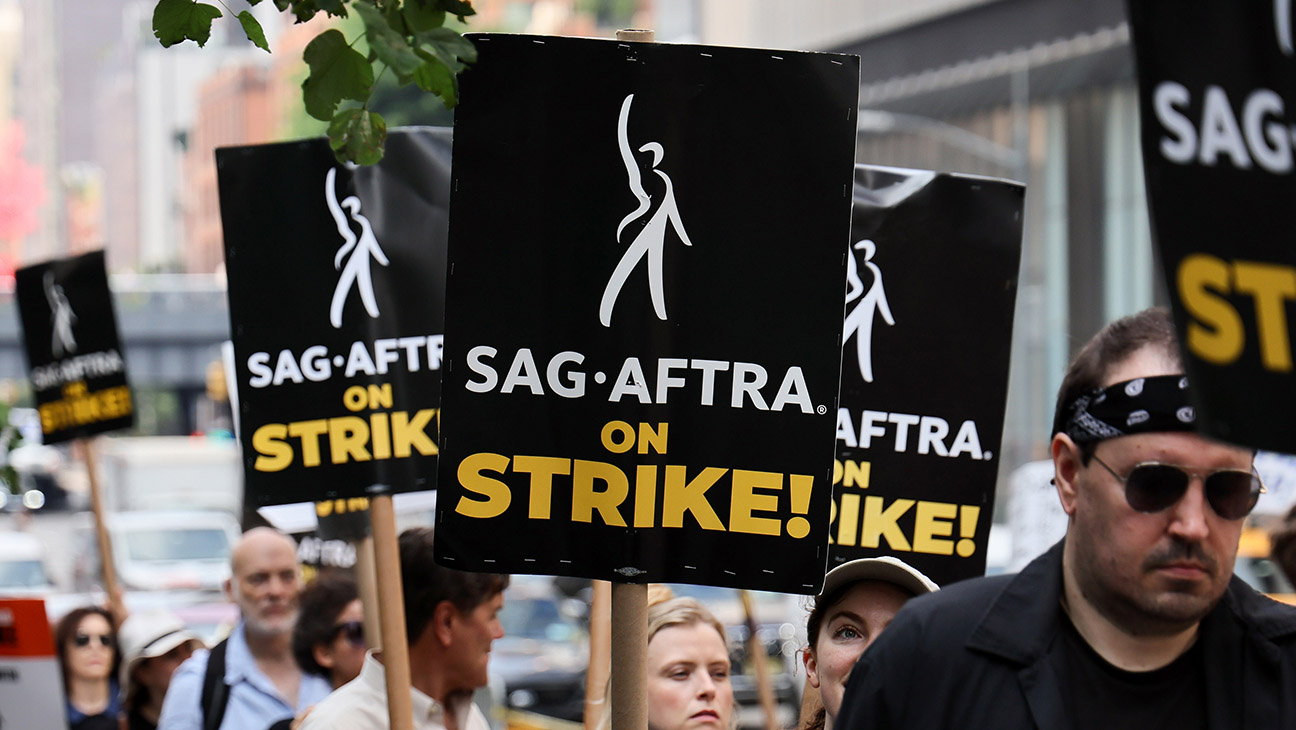WGA And SAG-AFTRA Strike: A Joint Hollywood Production Halt

Table of Contents
Key Demands of the WGA Strike
The WGA strike is fueled by several core concerns impacting writers' livelihoods and creative freedom.
Fair Wages and Residuals in the Streaming Era
The shift to streaming platforms has drastically altered the compensation landscape for writers. Traditional models of residuals, which provided writers with ongoing payments based on a show's success, have been significantly diminished. This has resulted in a substantial decrease in income for many writers, especially those working on successful streaming series.
- Reduced Residuals: Streaming services often pay significantly less in residuals compared to traditional network television.
- Shorter Seasons: Shorter seasons mean less work and fewer opportunities for residual payments.
- Unclear Revenue Models: The opaque nature of streaming revenue makes it difficult for writers to understand and negotiate fair compensation.
- WGA Demand: The WGA demands a return to fair residual structures that reflect the success of shows across all platforms, including streaming.
Protecting Writers' Rights in the Age of AI
The rapid advancement of artificial intelligence poses a significant threat to writers' jobs and creative control. AI writing tools can potentially generate scripts, diminishing the need for human writers. The WGA is fighting to protect its members from this disruption.
- AI-Generated Content: Concerns exist regarding the use of AI to generate scripts without proper compensation for writers.
- Copyright Infringement: The potential for AI to plagiarize existing work is a major concern.
- WGA Demand: The WGA is demanding clear regulations on the use of AI in scriptwriting, ensuring writers retain creative control and receive fair compensation when AI is utilized in the creative process. This includes transparent guidelines on how AI is used and the establishment of proper credit and payment for human writers’ contributions.
Improving Working Conditions
The WGA strike also highlights the need for improved working conditions in the television and film industry. Many writers face unreasonable workloads, long hours, and inadequate staffing.
- Minimum Staffing Levels: The WGA is advocating for minimum staffing levels to ensure projects are adequately staffed and writers are not overworked.
- Reasonable Hours: The union is pushing for more reasonable working hours, addressing the issue of burnout and maintaining a healthy work-life balance.
- Fair Treatment: The WGA is fighting for fair and respectful treatment of writers by producers and studios.
Key Demands of the SAG-AFTRA Strike
SAG-AFTRA's strike mirrors many of the WGA's concerns, highlighting the shared challenges faced by both writers and actors in the evolving entertainment landscape.
Fair Compensation and Residuals for Streaming
Similar to the WGA, SAG-AFTRA actors face reduced compensation and residuals due to the shift to streaming platforms. The traditional model of payment based on box office success or television ratings is not effectively translated to the streaming environment.
- Reduced Streaming Residuals: Actors receive drastically reduced payments compared to traditional media.
- Transparency Issues: The lack of transparency regarding streaming revenue complicates fair compensation negotiations.
- SAG-AFTRA Demand: SAG-AFTRA is demanding a fair share of streaming revenue, reflecting the success of projects and the actors' contributions.
Protecting Actors from AI and Self-Tape Exploitation
SAG-AFTRA is also concerned about the ethical implications of AI in the entertainment industry and the exploitation of actors' time and resources through self-tape auditions.
- AI-Generated Likenesses: The use of AI to generate actors' likenesses and voices without consent or compensation is a major concern.
- Unpaid Self-Tapes: Actors are often required to submit numerous self-tape auditions without compensation, incurring costs for equipment and time.
- SAG-AFTRA Demand: SAG-AFTRA is demanding regulations to protect actors from AI exploitation and ensure fair compensation for self-tape auditions.
Health and Safety Regulations on Set
SAG-AFTRA is committed to improving health and safety regulations on film and television sets, addressing issues such as long working hours, inadequate rest periods and potential hazards.
- Excessive Hours: Long working hours are commonplace in film and television, often leading to exhaustion and decreased safety.
- Lack of Rest: Insufficient breaks and rest periods can increase the risk of accidents and injuries.
- SAG-AFTRA Demand: The union is advocating for stricter regulations to ensure safe and healthy working conditions on all sets.
The Impact of the Joint Strike on Hollywood
The combined force of the WGA and SAG-AFTRA strikes has brought Hollywood to a near standstill, with significant repercussions across the industry and beyond.
Production Halts and Economic Consequences
The strike has caused a massive halt in film and television production, resulting in significant economic consequences.
- Production Delays: Numerous projects are indefinitely delayed, impacting release schedules and potentially impacting revenue.
- Job Losses: Thousands of crew members, support staff, and other industry professionals are facing unemployment.
- Financial Losses: Studios and production companies are incurring substantial financial losses due to production delays and potential revenue reductions.
The Ripple Effect on Related Industries
The ripple effect of the strike extends far beyond the entertainment industry itself. Related industries like catering, transportation, and post-production are also severely impacted.
- Catering Companies: Catering businesses that rely on film and television productions are facing significant revenue losses.
- Transportation Services: Companies providing transportation services for film crews are experiencing decreased demand.
- Post-Production Houses: Post-production facilities are facing reduced workloads and potential staff cuts.
Public Perception and Support for the Strikes
Public opinion largely supports the strikes, recognizing the importance of fair compensation and improved working conditions in the entertainment industry.
- Social Media Support: Significant social media support for the striking unions demonstrates widespread public sympathy.
- Media Coverage: Major news outlets have extensively covered the strikes, highlighting the key issues and the impact on the industry.
- Public Sentiment: Polls and surveys suggest that a significant portion of the public understands and supports the strikers' demands.
Conclusion: Navigating the Future After the WGA and SAG-AFTRA Strike
The WGA and SAG-AFTRA strike represents a pivotal moment in the entertainment industry. The key demands for fair wages, improved working conditions, and protection from AI exploitation highlight crucial issues impacting the future of creative labor. The joint strike's impact is far-reaching, affecting production schedules, economic stability, and the overall perception of the industry. The outcome of these negotiations will significantly shape the future of filmmaking and television production. Stay informed about the WGA and SAG-AFTRA strike and its developments by following updates from the respective unions' websites and reputable news sources. The future of Hollywood depends on a resolution that addresses the core concerns driving this unprecedented joint action.

Featured Posts
-
 Kyle Kuzma Responds To Jayson Tatums Controversial Instagram Post
May 08, 2025
Kyle Kuzma Responds To Jayson Tatums Controversial Instagram Post
May 08, 2025 -
 Arsenal Psg Macin Yayinlandigi Kanal Ve Saat Bilgisi
May 08, 2025
Arsenal Psg Macin Yayinlandigi Kanal Ve Saat Bilgisi
May 08, 2025 -
 Honest Take Jayson Tatum Comments On Steph Currys All Star Performance
May 08, 2025
Honest Take Jayson Tatum Comments On Steph Currys All Star Performance
May 08, 2025 -
 Arsenal V Psg Champions League Semi Final Preview
May 08, 2025
Arsenal V Psg Champions League Semi Final Preview
May 08, 2025 -
 Update On Jayson Tatums Wrist Celtics Head Coach Weighs In
May 08, 2025
Update On Jayson Tatums Wrist Celtics Head Coach Weighs In
May 08, 2025
